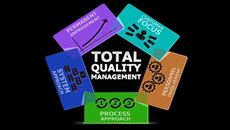- Delivery Method Online
- Professional Certificate
- 24hrs Suggested Study Time
- 3 Months Access
- Tutor Support
- Study On Any Device
- 483 Students
Manufacturing Applications

Increase efficiencies and productivity by learning to apply the principles and concepts of manufacturing.
Learn to apply the principles and concepts of manufacturing. Discover the nature of strategy and learn how it leads to the development of manufacturing strategy. Understand the purpose of customer demand forecasting and find out what forecasting methods are suitable for which situations. Explore the nature of planning and learn how to effectively use Gantt charts and the precedence diagram method. Determine how purchasing, production and inventory control, and logistics support a manufacturing operation. Discover the basics of lean manufacturing and see how capacity management converts production plans into concrete products. Learn why manufacturing, industrial, and quality engineering are so essential to any firm. Understand the true meaning of productivity and how to improve it.
In this self-paced online course, you will learn how successful organisations effectively use master production scheduling (MPS), production activity control (PAC), material requirements planning (MRP), and inventory management. You'll also discover how the application of Six Sigma, and statistical process control (SPC) increase customer satisfaction, and you'll learn about the elements of a logistics system, including warehousing and receiving.
Courses are delivered to you through expertly executed lessons, online instruction and interaction with like-minded students. Our courses are designed to deliver all of the benefits of studying in a classroom whilst giving you the flexibility to study at a time and place to suit your needs. You can access your classroom 24/7 from any device with an internet connection.
This course has a 3 month duration. You'll complete comprehensive lessons, quizzes and assignments before submitting your final exam at the end of the course to achieve your certificate. Courses must be completed within the 3 month access period.

Tony Swaim
Tony Swaim has helped many clients, colleagues, and students reach their professional and personal goals. He has been an online instructor since 1998 and has taught at colleges and universities across the United States since 1981. His focus areas ... Read more
Read Tony Swaim's ProfileFrequently Asked Questions
The Learning Environment
From the moment that you enrol in the Manufacturing Applications you will become an integral part of our learning community. You'll find yourself with the freedom to learn at a speed that suits you, on any device, from anywhere in the world. Achieving your career goals no longer has to mean compromising family and work commitments.
Ready to get started?
Enrol NowOur Values
Learn At Your Own Pace
We believe in personalised learning. That's why we provide all the tools and support you need to succeed at your own pace. With flexible learning, you'll stay motivated and retain more information. Plus, you can balance your studies with work and family commitments to make your dreams a reality.
We Won't Break The Bank
Education should be accessible to anyone who wants to learn. That's why we offer some of the most competitive prices in the industry with payments plans for just $25 per week. Investing in your future is a smart choice and doesn’t have to break the bank.
Industry-Led Courses
There's no better way to learn than from experts with years of experience in your field. That's why each of our 200+ industry-led courses are designed to give you a real-life perspective on your industry. With our expert mentors, you'll learn from people who have a wealth of knowledge and experience, and who are passionate about sharing it with you.
Get The Personal Support You Deserve
At Vibe Learning, we're real people who are dedicated to providing you with personal support every step of the way. Our industry experts are not only professional and knowledgeable but also incredibly passionate about sharing their expertise with you. With their guidance, you'll gain invaluable insights and practical knowledge to help you succeed.
Still looking?
Check out the following courses related to Manufacturing Applications:





